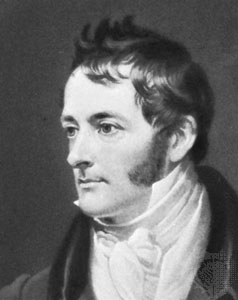William Henry (chemist) facts for kids
Quick facts for kids
William Henry
|
|
|---|---|
 |
|
| Born | 12 December 1774 |
| Died | September 2, 1836 (aged 61) Pendlebury, England
|
| Nationality | English |
| Alma mater | University of Edinburgh |
| Known for | Henry's law |
| Awards | Copley Medal (1808) |
| Scientific career | |
| Fields | chemistry physician |
William Henry (born December 12, 1774 – died September 2, 1836) was an important English chemist. He was born in Manchester, England. William Henry is most famous for developing something called Henry's Law. This law helps us understand how gases dissolve in liquids.
Contents
About William Henry
William Henry started his career by learning from Thomas Percival, a well-known doctor. Later, he worked at the Manchester Infirmary. He began studying medicine at the University of Edinburgh in 1795. He earned his medical degree in 1807.
However, William Henry often had poor health. Because of this, he could not work much as a physician (doctor). Instead, he spent most of his time doing chemical research. He was especially interested in how gases behave.
Henry's Law Explained
One of William Henry's most famous studies was published in 1803. In this paper, he described his experiments on how much gas water could absorb. He looked at different temperatures and pressures. The results of these experiments became known as Henry's law.
Henry's Law states that the amount of gas that dissolves in a liquid is directly related to the pressure of that gas above the liquid. Think of a fizzy drink: when you open the bottle, the pressure drops, and the gas (carbon dioxide) escapes as bubbles. This is Henry's Law in action!
Other Important Work
Besides Henry's Law, William Henry wrote many other important papers. He studied how to analyze different gases. He also researched Firedamp (a dangerous gas found in mines) and gas used for lighting. He looked into the makeup of hydrochloric acid and ammonia.
In 1799, he published a popular book called Elements of Experimental Chemistry. This book was very successful and was printed eleven times over 30 years.
William Henry was also one of the people who helped start the Mechanics' Institute. This institute later became part of the University of Manchester Institute of Science and Technology.
Awards and Recognition
William Henry was a highly respected scientist. In 1808, he received the famous Copley Medal. This is a very important award given by the Royal Society. The next year, in February 1809, he was elected a Fellow of the Royal Society. This means he became a member of this prestigious scientific group.
See also
 In Spanish: William Henry para niños
In Spanish: William Henry para niños
- Mercury beating heart
- Henry adsorption constant
 | Audre Lorde |
 | John Berry Meachum |
 | Ferdinand Lee Barnett |

